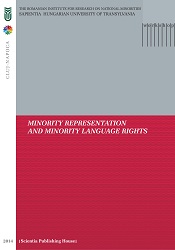Ethnic Minorities and Censuses
Ethnic Minorities and Censuses
Author(s): Inez Zsófia Koller
Subject(s): Politics / Political Sciences
Published by: Scientia Kiadó
Summary/Abstract: In many countries of Central and Eastern Europe and the Balkans, national censuses counted citizens during 2010 and 2011. Census questionnaires included questions on minority identity and the different native languages from the official language of the countries. So, minorities were counted as well. Widescale experiences of the 20th century has taught minorities to handle censuses gingerly as there are different motives of national and ethnic minorities in confessing their ethnic identity, country by country. One aim of my (already a half-year-long) investigation is to create a data comparison from national censuses of the last one or two years in Central and Eastern European and Balkan countries. What are the gains and losses? How have data changed as compared to previous censuses. How have categories changed and how have national-level party politics changed on this topic as compared to previous censuses. Furthermore, within these flows, I am interested in the role of ethnic parties in encouraging minorities to do more for confessing their ethnic identity. What kinds of campaign methods did they take? How did ethnic tensions rise in connection with censuses? Finally, my last question is just a symbolical one: are there any changes in the relation of the number of minorities to their political representation? My study focuses on comparable statistical data, judiciary documents and press articles.
Book: MINORITY REPRESENTATION AND MINORITY LANGUAGE RIGHTS
- Page Range: 319-333
- Page Count: 15
- Publication Year: 2014
- Language: English
- Content File-PDF

